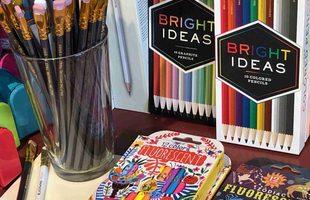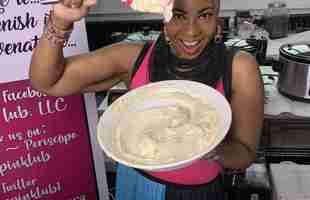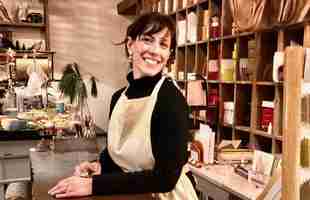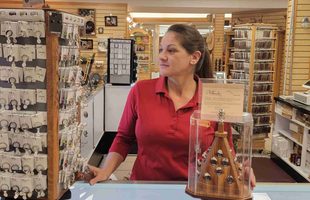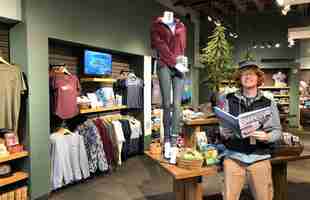Apparel Trends at Black-Owned Apparel Boutiques
Over 15 years in Philadelphia retail, Steve Jamison has been successful by building relationships. He greets every potential client at Blue Sole Shoes with a handshake upon entering, or a wave as they walk by.
“The most important factor is listening to customers and understanding their particular needs,” Jamison explained. He makes sure his staff asks questions to get an idea of what patrons are looking for — and if Blue Sole doesn’t have it, he’ll refer them somewhere else: “It’s not necessarily about making the sale that day.”
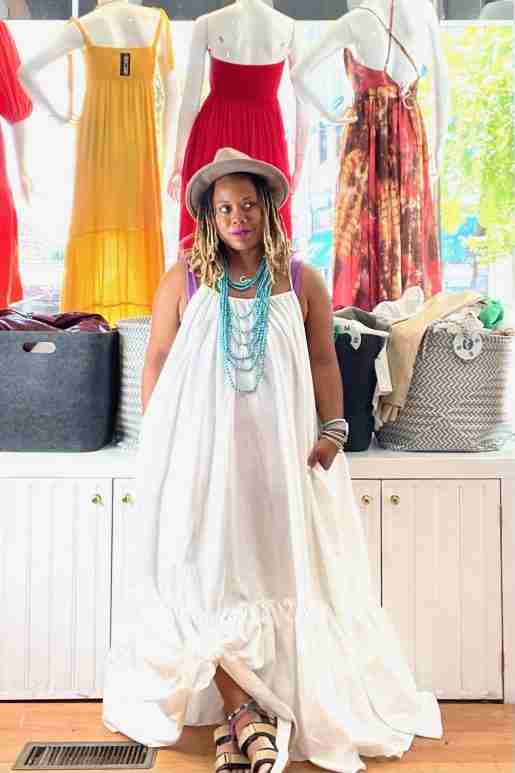 Sherri Hall, owner/designer, of Blacqskirt The Design House in Philadelphia, Pa. Hall launched her brand in 2007, and the business now includes both online and physical stores as well as pop-up boutiques.
Sherri Hall, owner/designer, of Blacqskirt The Design House in Philadelphia, Pa. Hall launched her brand in 2007, and the business now includes both online and physical stores as well as pop-up boutiques.That service-driven approach to retail is what makes Blue Sole Shoes among Philadelphia’s most successful Black-owned businesses. The venerable Center City store carries a huge selection of styles and brands, from fashion sneakers to formal dress shoes. Jamison is always adding new items from trade shows, and he has long-standing relationships with designers and manufacturers.
“My clientele is everyone from a young guy buying a pair of shoes for prom to an older, perhaps retired gentleman who just loves shoes,” noted Jamison. While his store’s huge variety means no single brand is a best-seller, Jamison has noticed a trend toward sportier looks, even for the office or dressy occasions. “I think it’s because men are generally dressing more casually lately,” the retailer observed.
Comfort is also a priority for shoppers at Sincerely, Tommy, a Black-owned Brooklyn boutique. Vintage Curator Mary Williams said the store’s best-sellers are “things that are sheer, lightweight, breezy,” she said, noting that she sources her wares “all over the place.” Reflecting the dual trends of 2022, Sincerely, Tommy customers either want oversized looks or body-conscious, skin-tight styles this year, Williams said.
The retailer thinks she’s been successful by relying on her fashion instincts. “I generally think of myself as someone who has great taste, and that translates fairly well” to the boutique, Williams said. “People trust me to decipher what I think looks cool, and what shoppers will like.”
Over eight years in Bedford-Stuyvestant, the self-styled “lifestyle concept store” has built that trust through a local approach. “If they’re neighborhood people, they’re looking for you to recognize them when they come in,” Williams explained. “They want that personal interaction, to not make it so cold.”
A comfortable, homey environment is also the goal at the BLACQSKIRT Design House in Philadelphia, Pa. “We want you to feel welcome,” said Store Manager Makai Dennis. “You may come in not looking your best or feeling your best. But when you walk out, we want you to feel your best. We hope you try whatever you want, we give you options, we’re never rushing you.”
The BLACQSKIRT Design House was born after Sherri Hall, frustrated at finding clothing that fit well, turned to her mother, Sybil Lyles, an experienced seamstress. The two developed a collection of A-line skirts, the signature item for a brand that launched in 2007. Today, the business includes an online store and pop-up boutiques, in addition to a 750-square-foot location in the Mt. Airy neighborhood. Shoppers will find a selection of Hall’s hand-crafted goods along with new and up-cycled garments.
To that end, the brand offers what Hall calls inclusive sizing — from size XS to 3X, so most women can find something that fits. “We also never buy things twice,” explained Dennis. “So you’ll be able to wear things you buy here without seeing them on anybody else.”
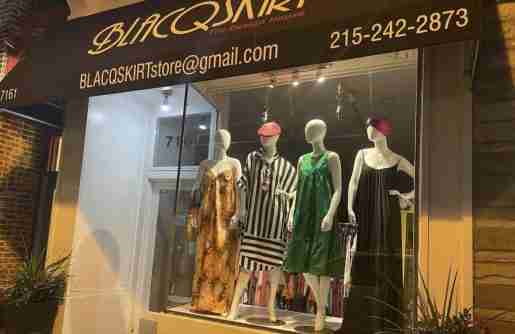 An exterior view of Blacqskirt. Creating a comfortable, homey environment is a goal for the business.
An exterior view of Blacqskirt. Creating a comfortable, homey environment is a goal for the business.
Some Black-owned stores, like Kutula by Africana, appeal to customers with an overtly African aesthetic. The Los Angeles emporium specializes in what Owner Bo Anuluoha calls authentic African fabrics, especially the best-selling dashikis and flowy dresses popular with customers.
Anuluoha travels widely and visits trade shows to source her merchandise. “I do my research,” she said. “We have the best in the country when it comes to selection.” In the era of online shopping, Anuluoha also knows shoppers visit her 1,000-square-foot store for a one-on-one experience. “That’s why people go to boutiques — because they want personal service,” she said.
Building those relationships is more important than ever for independent boutiques, according to Shanae Simon, owner of Closet of Classè in Tampa, Fla. “I constantly talk to people,” said the retailer. “Anywhere and everywhere you go, you should start with, ‘I own this business.’ Just whenever it comes up in the conversation. I mean, how will people know about your brand if you don’t tell them?”
Simon’s is a 100% resell business: She buys fashion and accessories from locals, then re-sells them at impulse-buy prices. It’s an inclusive retail model, with sizes from XS to 2X and most items under $15. “I have women from 18 all the way to 70 come in and shop,” Simon said.
“Going-out pieces” are always popular, especially statement tops. “And sunglasses, always. You can never have too many of those,” Simon noted. “People love finding things here that are unique; they’re one of a kind. And stylish. And everything is $20 or less.”
